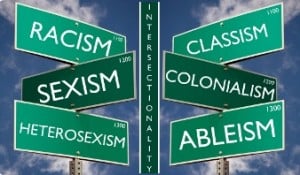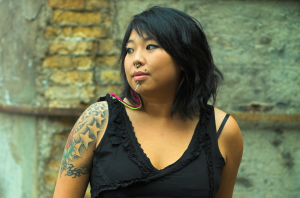
Everyday Feminism
I read an interesting article once that was written by a person who had infiltrated the Westboro Baptist Church (WBC).
The person explained that the nearly universal dislike for the WBC actually helps the efforts of other churches who equally disapprove of sexual orientations that are not heterosexual, simply because they seem less radical and more logical in comparison.
After all, a church that is not holding signs showing anal sex or picketing concerts can receive a lot more support from people. And that may actually make them more dangerous than WBC could ever be.
And outside of the church, one of the most dangerous places that such beliefs about non-heterosexuality are being conveyed to people is in a mental health professional’s office.
And just like the church that knows better than to picket soldiers’ funerals, many of these therapists can offer an attractive package filled with more palatable messages of unacceptance – ones that are cloaked in declarations of concern for their clients.
This article will look at the practice of “conversion therapy” (also known as “reparative therapy”), which is the attempt at changing someone’s sexual orientation to heterosexual via therapy.
It will look at what the mainstream medical and mental health organizations have to say about such a practice – and what is being done about it.
How Professional Mental Health Organizations View Conversion Therapy
In the United States and several other countries, efforts to make conversion therapy an illegal practice is becoming more common.
Several states, including California and New Jersey, have passed laws banning the use of conversion therapy for youth under the age of 18 years old.
These efforts have been supported by professional mental health organizations. In addition, every prominent medical and mental health organization – representing over 480,000 mental health professionals in the US – denounce the use of conversion therapy and find the practice to be harmful.
The problem is that these organizations obviously do not speak for every individual therapist.
One study found that one-in-five licensed marriage and family therapists believed that conversion therapy was an ethical practice, despite their main professional association’s official position against it.
Unfortunately, there are usually no sanctions against a therapist for practicing this therapy, and that is likely why some continue to do it.
This is not the case everywhere.
In the UK, many of the major mental health associations have also united under the position that conversion therapy should not be practiced. And they’re willing to put some force behind that.
In 2011, a British psychotherapist was found guilty of professional malpractice and had her accreditation suspended by the British Association of Counselling and Psychotherapy after she was video recorded attempting conversion therapy with a gay undercover reporter.
And there are people in the United States that feel that this is the way conversion therapy should be handled here. Professional associations should be figuring out ways to sanction these conversion therapists instead of the legal system getting involved.
They argue that it’s a slippery slope: The government could then decide to do this for any therapy that they don’t like, and it infringes on someone’s personal choice to have this therapy.
The truth is that therapists are ethically obligated to respect a client’s wishes and autonomy, but we also have to weigh that with our ethical obligation to do no harm.
And some professional counseling associations find that it is ethical to deny conversion therapy to clients, even if that’s what they want.
There are times when providing clients “what they want” is simply not appropriate and must be refused, but that doesn’t mean that the therapist must refuse to help at all.
There are other therapies that are recommended for people who are struggling with their same-gender attractions.
These therapies may help a person explore social factors like heteronormativity and homophobia as possible reasons for the person being uncomfortable with their same-gender attractions.
They do not, however, insist that you must be non-heterosexual to feel these attractions.
3 Common Categories of Conversion Therapy
So, what kind of stuff goes on in conversion therapy?
Well, because it’s not a regulated therapy practice, and there are no official training programs that are sanctioned by any major mental health accreditation body, it’s hard to know.
There are many reports from clients that describe anything from talking to a therapist to enduring severe physical and emotional abuse.
The messages and theories that some of these therapists put out there to explain how people become non-heterosexual can also be quite diverse. I will discuss some of these theories, but I will not be linking to their pages.
I put some of the theories into three categories: God’s fault, their fault, and your fault.
1. It’s God’s Fault
Conversion therapists who practice this therapy as a result of their religious beliefs about sexual orientations will tell you that heterosexuality is the only God-sanctioned orientation. In addition, God wants traditional gender roles with men being masculine and women being feminine.
Of course, male and female are the only God-sanctioned genders, too.
God has specifically outlined stages of development that children must go through that are designed to bring up children to be good heterosexual people.
It’s when children don’t go through these stages successfully that God’s will is not fulfilled. And that is when the blame shifts to others.
2. It’s Their Fault
Parents – which, according to most conversion therapists, should ideally be a female (mother) and male (father) – have the job of teaching their same-gender child about how to be that gender.
If they fail to do this, then their child will likely begin to identify with their other gender parent and take on their qualities.
So, a young girl may become a tomboy, while a young boy might become more feminine. This may later lead to same-gender attractions because the child didn’t adequately bond with their same-gender parent as a child.
Of course, many conversion therapists point to sexual abuse as being a potential cause for non-heterosexuality, and some even blame therapists who openly support non-heterosexual children or children who come to therapy with confusion about their same-gender attractions.
Essentially, someone along the way didn’t do right by the child if they ended up being anything other than straight.
3. It’s Your Fault
According to some conversion therapists, children who may be leaning toward non-heterosexuality may have some common characteristics.
Boys may be more artistic rather than athletic and may be more sensitive. Girls may behave more like a tomboy, rather than a feminine person.
As a result of these children behaving outside of their gender roles, they are more likely to be mocked and rejected by peers.
The child’s craving for same-gender friendship that they’re not getting because of their gender non-conformity can then become sexual when the child becomes a teenager and begins to experience sexual desire.
Honestly, these are real theories. I don’t have the imagination to make this shit up.
Why Conversion Therapy Is About Prejudice – Even Though They Say It’s Not
Now, these theories may sound ridiculous, especially with my not-so-subtle bias against them, but when they’re being explained to a person who comes to a therapist desperate for help because they feel guilty about their sexual orientation – they can be believable.
The idea that heterosexuality is the only correct sexual orientation – and that all others are likely the result of a series of developmental errors, parenting mistakes, or miscellaneous traumas – has absolutely no support in research.
Essentially their message is this: If you are raised in the right conditions, the only sexual orientation that you could possibly have is heterosexuality – since all others are the result of something going wrong.
Interestingly, many conversion therapists deny that they have a bias or that they shame their clients. If that’s true, then it seems unusual that negative factors are never blamed for heterosexuality, only non-heterosexuality.
I mean, I never hear them say something like, “Well, there are many reasons a person could be practicing the heterosexual lifestyle, they may have went through a developmental crisis, they may have been sexually abused, or they may just be succumbing to negative peer pressure.”
Now, here is where some conversion therapists can be persuasive.
Unlike your Uncle Bart that yells traditional phrases at you like “You’re choosing to be gay,” a conversion therapist may come at you with “I know you are not choosing this. Let me tell you how this usually happens and we can work on it together.”
This sure sounds more welcoming than Uncle Bart, and at least they’re indicating that it’s not a choice, right?
Well, yes, but only because they’re convinced that the unhealthy circumstances in your life led to the outcome of you being non-heterosexual – not because it isn’t a problem.
Conversion therapists like to defend their practice by saying that they’re only giving the client what they want – that by denying conversion therapy you are ignoring the desires of your clients.
But that argument doesn’t hold up – because they would likely refuse a heterosexual who came in to their office and asked to be converted to a different sexual orientation.
And it would be in that refusal that their bias makes itself known.
By saying no, the therapist demonstrates clearly that they discriminate against anyone who is not heterosexual, that they clearly believe that heterosexuality is the only acceptable orientation.
And that is in direct contradiction to all major mental health organization’s codes of ethics.
It would also show that their interest is not really what the client wants, but rather what they want for their client based on their own beliefs.
The truth is that there is absolutely no credible research-based evidence to suggest that this therapy works and is safe. There are, however, many studies that have concluded that conversion therapy can be harmful.
Perhaps the most damning evidence that it’s harmful comes through the words of Dr. Robert Spitzer, the researcher who wrote a highly controversial article in 2003 indicating that conversion therapy had been successful on people.
In 2012, Dr. Spitzer acknowledged the errors in his research and issued an apology to the gay community.
Therapists have an ethical obligation to promote evidence-based education about mental health matters to our entire society – not just our paying clients.
When a therapist puts out videos and hosts websites that promote completely false information about sexuality that could potentially harm someone who finds it, they are being unethical… period.
***
If you are a young person who is being subjected to this type of therapy, The Trevor Project could be a good, supportive resource for you.
If you are an adult wanting therapy and you are concerned about being met with unacceptance, check out the potential therapist’s website and literature, and I suggest asking them directly about their work with non-heterosexual people.
If you are a conversion therapist who strongly opposes this article, my mother has a few thoughts for you regarding your theories about her lesbian daughter.
***
To learn more about this topic, check out:
- 5 Challenges for Modern LGBTQIA+ Teens (And How You Can Help)
- 4 Off-Putting Messages We Send to Trans Men Considering Pregnancy
- Your First Time: A Sexual Guide for Non-Binary People Working Through Trauma
- 3 Issues That Impact the Mental Health of LGBTQIA+ Youth
[do_widget id=”text-101″]
Dr. Robin Landwehr is a Contributing Writer for Everyday Feminism She’s a mental health counselor and an unapologetic feminist. She holds a Doctor of Behavioral Health degree from Arizona State University, a M.S. degree in Mental Health Counseling from Capella University, and is a licensed counselor in North Dakota and Florida. You can follow Robin on Twitter @RobinLandwehr1 or visit her sometimes neglected personal blog at The Hippie in Me Blog.
Search our 3000+ articles!
Read our articles about:
Our online racial justice training
Used by hundreds of universities, non-profits, and businesses.
Click to learn more




















